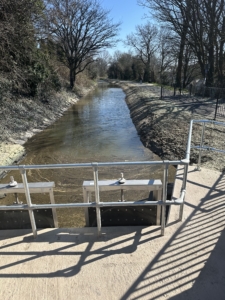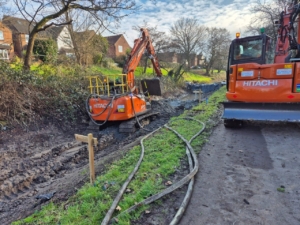CASE STUDY
Client: Pritchard’s and Newport City Council
Project: Monmouthshire & Brecon Canal, Newport
Deep Soil Mixing Ltd recently successfully completed its project for client Pritchard’s and Newport City Council, carrying out innovative ground stabilisation works on the Monmouthshire and Brecon Canal in Newport to repair the impermeability of the canal lining.
In February 2025, the work on the canal was completed and the project proved that soil mixing is an effective way to enable canals to hold water.
Working closely with Pritchard’s, Deep Soil Mixing Ltd overcame the challenges of operating in a size restricted environment by using specialist machinery to mix the soil in the base of the canal with specially selected binders to form an impermeable layer and enable the canal to become watertight once again.
The Solution
The Monmouthshire and Brecon Canal had fallen into a poor state as its impermeable barrier had been weakened to the point the canal was unable to hold water.
Deep Soil Mixing Ltd was asked to carry out soil stabilisation works using soil mixing as an alternative to using Puddle Clay to bolster the lining of the canal to make it watertight once more.
Initially, a 125m section of the canal that is perpendicular to Ruskin Avenue in Rogerstone, was lined with a soil mixed liner to prevent water from the canal permeating through the base of the canal.
This was done using a 750mm wide soil mixing bucket to mix the material on-site – locally sourced clay was mixed with binders including cement and bentonite in the base of the canal. The 13T excavator sat in the middle of the basin to spread the material evenly through the base and up the sides of the canal.
The mixed material was spread to the sides of the canal into preformed keys, right-angled cuts into the embankment of approximately 300mm x 600mm in size. The base was installed at 300-350mm in thickness, and the sides were installed at 250mm in thickness.
A 9T long-reach excavator was placed on the towpath with a ditching bucket to form an aesthetically pleasing finish to the mixed material.
The Project
The Monmouthshire and Brecon Canal had fallen into a poor state of repair, with large sections being dry in the summer months. The canal had become totally unnavigable, and Newport City Council was keen to reinstate a few kilometres of it.
Rather than bring in high specification Puddle Clay, it was decided that soil mixing was the quickest and most cost-effective solution.
Puddle Clay is not available locally and is difficult to install – in contrast, Deep Soil Mixing Ltd’s solution was to soil mix the existing canal bed material together with some imported local clays to achieve the impermeability standards required to enable the canal to hold water once
again.
This project successfully demonstrated that using the correct machinery is key to ensuring work can be carried out quickly and efficiently. Using soil mixing in this application proved that the system is suitable for projects that need to meet impermeability standards, it provided the solution for the much longer stretches of the canal that have also fallen into disrepair.
The project was challenging but rewarding as the canal section was an extremely small compound area – normally, a larger 35T excavator and 1500mm wide mixing bucket would have been used for a project like this one. Planning for the company’s set up was intensive.
However, by working with Deep Soil Mixing Ltd’s plant depot and external logistics to ensure minute-by-minute scheduling for the set up and subsequent removal from site, the project goals were achieved.
Deep Soil Mixing Ltd was on site for 4 weeks, and two of these weeks were for mobilisation and demobilisation.
Works began in January 2025 and the project was completed in February 2025.
What are the benefits of using soil mixing?
Environmentally Friendly & Economical: Natural resources are spared as existing soil is used as aggregates. Many forms of contaminated ground can also be mixed which reduces transportation of raw materials to landfill. The use of soil mixing can also reduce construction programme and reduces carbon footprint with less vehicular movements.
Flexible: Effective on different soils, including soft soils, flood plains, contaminated land, peat, silts and alluvium etc. Flexibility also in design and application as well as installation of the soil mix not being affected by the weather. The final cured product can also be shaped, benched or battered to suit.
Reduces Construction Programme
Improved health and safety due to less vehicle movements on site
Reduced Vibration: Soil Mixing induces very low vibrations, which reduces the potential impact to nearby utilities. The equipment does not exert any lateral pressure when mixing we can work as close as 200mm from the building/foundations
Increases bearing pressure, controls settlement and reduces permeability.
Wide range of soils can be treated compared to other solutions
No need to bring costly and bulky materials on site








